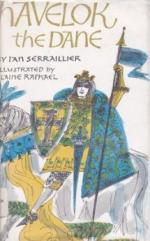“Now, I do not think that you would make a gain by my work this morning?”
“Truly not, if any one is wronged by my doing so,” the puzzled steward said.
Then Havelok asked how many men would have been needed to carry up the goods that he had brought, and Berthun said that he was wont to send one at least from each stall, and more if the burden was heavy.
“Then today four poor knaves must go dinnerless by reason of my strength, and that does not please me altogether,” said Havelok gravely. “Give these two their loaves; and then, I pray you, give me the other four, and let me go back to the market.”
And then he added, with a smile, “I think that I can order matters there so that things will be more fair, and that you will have less trouble with that unmannerly scramble.”
“If you can do that, you are even as your name calls you. Take them and welcome, Curan, and then come here and do what work you will,” Berthun said in haste.
“Tasks you must set me, or I shall grow idle. That is the failing of over-big men,” Havelok said; and he took the loaves and left the palace with the two market men at his heels.
I saw him come back, and at once the crowd of idlers made for him, but in a respectful way enough. I knew, however, how easily these folks took to throwing mud and stones in their own quarrels, and I was a little anxious, for to interfere with the ways of the market is a high offence among them.
But Havelok knew naught of that, and went his way with his loaves to the bridge end, and there sat on the rail and looked at the men before him. And lo! back to my mind came old days in Denmark, and how I once saw Gunnar the king sitting in open court to do justice, and then I knew for certain that I was looking on his son. And when Havelok spoke it was in the voice of Gunnar that I had long forgotten, but which came back to me clear and plain, as if it were yesterday that I had heard it. Never does a boy forget his first sight of the king.
“Friends,” said Havelok, “if I do two men’s work I get two men’s pay, or else I might want to know the reason why. But I am only one man, all the same, and it seems right to me that none should be the loser. Wherefore I have a mind to share my pay fairly.”
There was a sort of shout at that and Havelok set his four loaves in a row on the rail beside him. But then some of the rougher men went to make a rush at them, and he took the foremost two and shook them, so that others laughed and bade the rest beware.
“So that is just where the trouble comes in,” said Havelok coolly; “the strong get the first chance, as I did this morning, by reason of there being none to see fair play.”
“Bide in the market, master, and we will make you judge among us,” cried a small man from the edge of the crowd.
“Fair and softly,” Havelok answered. “I am not going to bide here longer than I can help. Come hither, grandfer,” and he beckoned to the old man who had bidden them wait his return, “tell me the names of the men who have been longest without any work.”




